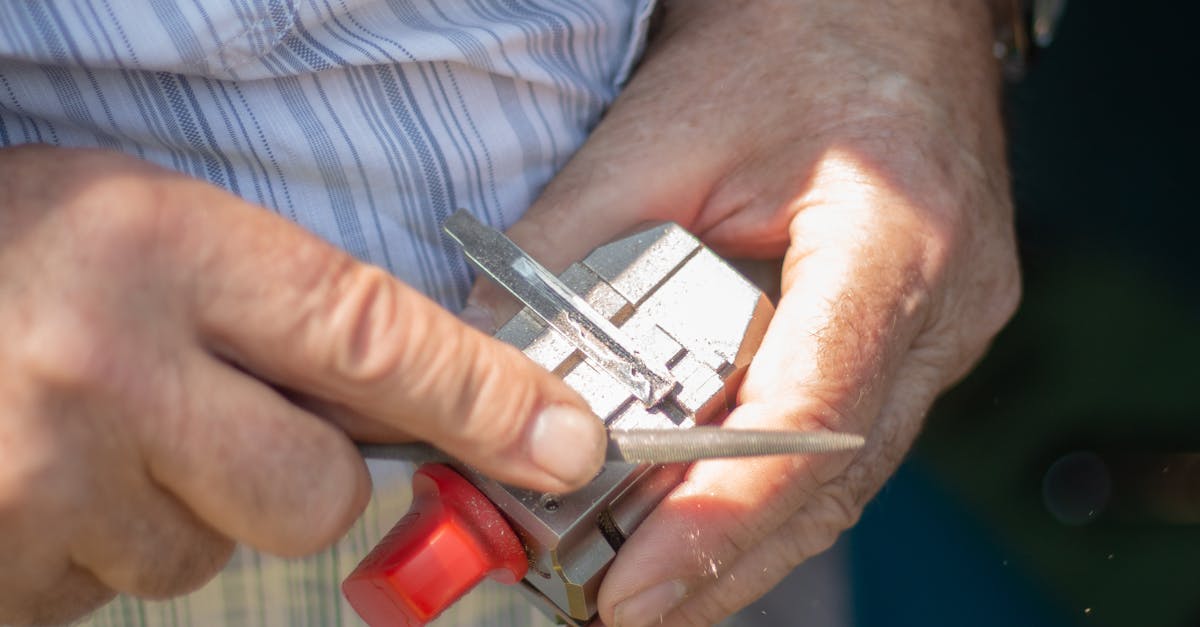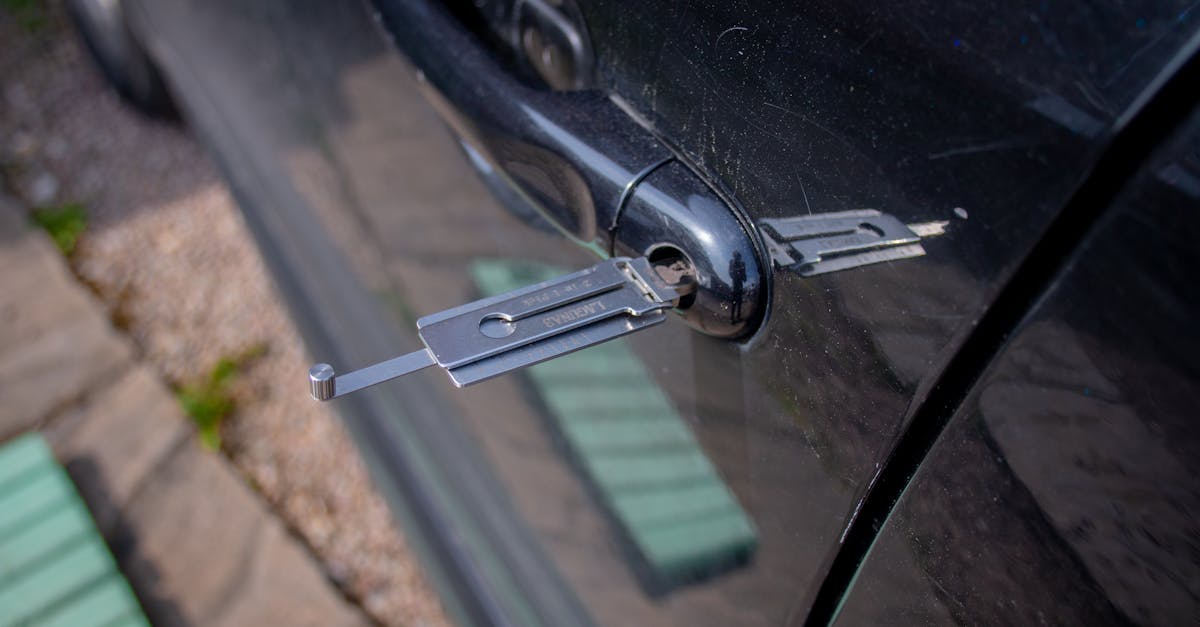
Cost Implications of Rekeying
Rekeying a lock can be a cost-effective solution for improving security without the expense of replacing the entire locking mechanism. The average cost typically includes fees for a locksmith's service, as well as the cost of new pins and other necessary components for the rekeying process. This option is often significantly cheaper than purchasing a new lock system.
However, the actual price can vary based on several factors, including the type of lock, the complexity of the rekeying process, and your location. Some locksmiths may charge a flat fee while others might bill hourly, which could impact the overall cost. Understanding these variables can help in budgeting for lock rekeying and ensuring that you receive the most appropriate service for your needs.
Factors Influencing the Cost of Rekeying a Lock
The cost associated with Lock Rekeying can vary significantly based on several factors. Firstly, the complexity of the lock itself plays a crucial role. Simple cylinder locks are generally cheaper to rekey than more intricate locks, such as those with built-in security features or electronic components. Additionally, the number of locks being rekeyed in a single service call can affect the overall cost, as many professionals offer discounted rates for multiple locks.
Another important factor is whether you opt for a professional locksmith or choose to tackle the job yourself. Hiring a skilled locksmith may come with a higher price tag, but their expertise ensures the job is done correctly. Conversely, DIY methods can reduce immediate expenses, but they may require purchasing specialised tools or replacement parts that can lead to unforeseen costs. The choice between convenience and cost-effectiveness ultimately shapes the expense associated with Lock Rekeying.
Tools and Equipment Used in Rekeying
For an effective lock rekeying process, specific tools and equipment are essential. A rekeying kit is the primary resource, which typically includes a range of pins, a follower, and a key gauge. These kits are designed to accommodate various lock types, making them versatile for different rekeying tasks. Additionally, a plug spinner may be helpful in instances where the cylinder must be rotated, ensuring a smoother rekeying process. Having the right tools on hand can significantly reduce the complexity of the task.
Moreover, a selection of screwdrivers, pliers, and a workbench with proper lighting can enhance the efficiency of lock rekeying. A pair of tweezers may prove useful for handling small pins and springs, while a flashlight can help inspect the lock mechanism closely. Understanding the specific tools required can lead to a more successful and streamlined rekeying experience, increasing both speed and accuracy in achieving desired results.
Essential Tools for Rekeying Locks
Lock rekeying requires a specific set of tools to ensure the process is effective and efficient. A rekeying kit is essential, as it typically contains various pins and springs to match the new key. Additionally, a socket wrench and screwdrivers of varying sizes assist in disassembling the lock. These tools help access the internal mechanisms seamlessly, allowing for a successful reconfiguration of the lock.
Another important tool is a key gauge, which helps in determining the correct pin length needed for the new key. This tool is vital in achieving a precise fit and functionality in the rekeying process. Moreover, needle-nose pliers are often used to handle small parts during reassembly. Having these tools on hand can greatly enhance the lock rekeying experience, ensuring that lock changes are simple and accurate.
Common Misconceptions About Rekeying
Lock rekeying often comes with several misconceptions that can lead to confusion among homeowners. One common myth is that the original key is always required to rekey a lock. While having the original key can simplify the process, it is not an absolute necessity. Skilled locksmiths can rekey a lock without the original key by disassembling the mechanism and replacing the pins within the lock cylinder to match a new key.
Another misconception is that lock rekeying significantly weakens the security of the lock. In reality, rekeying maintains the integrity of the lock while providing a fresh set of keys. This process allows homeowners to regain control over their property by ensuring that previous keys are rendered ineffective. By understanding the facts around lock rekeying, individuals can make more informed decisions about their home security needs.
Myths Surrounding the Need for Original Keys
A prevalent myth suggests that having the original key is a mandatory requirement for lock rekeying. Many assume that without it, the process becomes impossible, leading to misconceptions about the limitations of rekeying. In reality, skilled locksmiths can often rekey a lock without the original key by disassembling it and rearranging the internal components. This flexibility makes lock rekeying a feasible option even when the original key is lost or unavailable.
Another misunderstanding is the belief that rekeying a lock significantly compromises its security if the original key is not used. While the original key may offer a straightforward method for the process, rekeying can still enhance security by updating the lock’s inner workings. This adjustment effectively renders any previous keys—lost or stolen—ineffective. Thus, the focus should remain on professional expertise in lock rekeying rather than solely on the possession of an original key.
FAQS
Do I need the original key to rekey my lock?
No, you do not necessarily need the original key to rekey a lock. A professional locksmith can rekey the lock without the original key by disassembling it and creating a new key that matches the new pins.
What are the advantages of rekeying a lock without the original key?
Rekeying without the original key can enhance security by preventing unauthorised access, especially if the original key is lost or stolen. It is also a cost-effective solution compared to replacing the entire lock.
Can I rekey my lock myself if I don't have the original key?
While it is possible to rekey a lock yourself without the original key, it can be a complex process that requires specific tools and knowledge. It is generally recommended to hire a professional locksmith for best results.
How much does it cost to rekey a lock without the original key?
The cost to rekey a lock can vary depending on the locksmith and the complexity of the lock. On average, it may range from $50 to $100, but it's best to get a quote from a professional.
Will rekeying my lock affect its warranty?
In most cases, rekeying a lock should not void its warranty. However, it is advisable to check the warranty terms or consult the manufacturer for specific guidelines regarding modifications.
